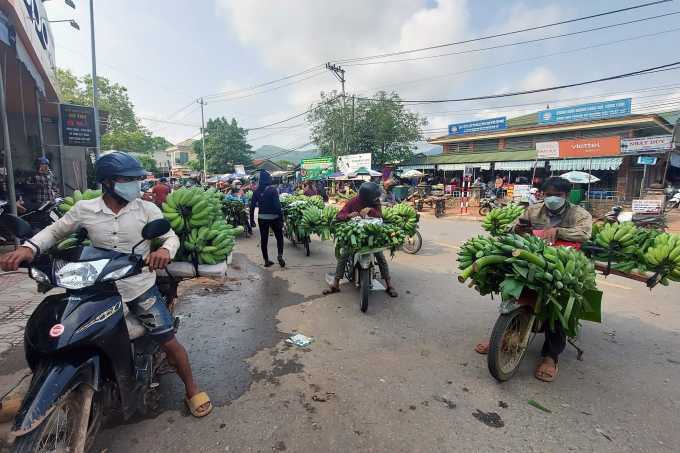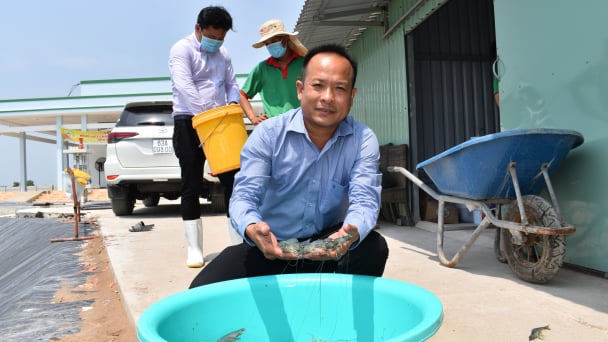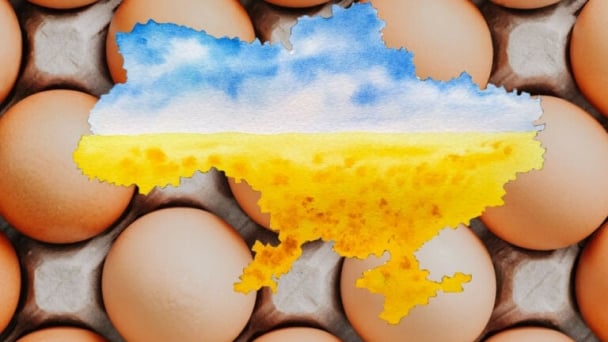May 21, 2025 | 08:46 GMT +7
May 21, 2025 | 08:46 GMT +7
Hotline: 0913.378.918
May 21, 2025 | 08:46 GMT +7
Hotline: 0913.378.918
According to the Department of Agriculture and Rural Office of Huong Hoa district, the province’s banana growing area is concentrated mainly in communes bordering Vietnam - Laos with an area of over 3,500 ha. Statistics show that most of the area concentrated in the Lia region and communes along the National Highway 9 are in the harvesting period.
There was a time when Siamese bananas brought high profits, leading to many households renting land in Laos to grow. However, due to the fact that Siamese bananas cannot be exported in the past few years, most of the growing areas in Laos are left neglected.

A solution is required in order to consume bananas for Huong Hoa farmers. Photo: Vo Dung.
Tan Long commune (Huong Hoa district) had 200 banana growing households with an area of nearly 1,000 ha. Each family could earn a profit of VND 100-500 million/year. Siamese banana has long become a key crop of people in this commune, and the living standards of the people in the border areas had been significantly improved. Banana farmers owning houses worth billions of dong was not a rarity in this impoverished land. But that was the story of 2-3 years ago.
Apart from being a trader specializing in buying bananas, Mr. Doan Quang Thien in Tan Thuan village (Tan Lap commune) also invested in growing 2 ha of Siamese bananas. His family used to earn several hundred million dong per ha, but in the past few years the price of bananas dropped dramatically. So like many other households, he became unwilling to take care of the banana garden.
“People here grow their own crop and then find their own way to sell to private traders. When many traders quit their jobs, the people are left with helplessness. They bring bananas to markets and sell whatever they can. You won't be able to think of growing anything more efficient and easy than banana here, so some households still hesitate to convert to other crops. But if the situation continues, people will take that risk at some point."

Many households have considered discarding Siamese banana gardens. Photo: Vo Dung.
Faced with the serious drop in banana prices, the People's Committee of Huong Hoa district has encouraged a number of individuals and units in the area to develop the banana drying industry as a way to help farmers in terms of consumption. Over the years these establishments have consumed approximately 300 tons of bananas every year. However, that is only a very small number compared to the annual banana output of Huong Hoa district. Most of today's bananas still have to be brought to the retail market while there is no longer a scene of traders competing for orders or setting up agents in remote areas to buy bananas like before.
Mr. Hoang Dinh Binh, Head of the Department of Agriculture and Rural Office in Huong Hoa district, said the state of Siamese bananas left unpurchased due to the inability to export weighed heavily on the mind of the local authorities, but they were unable to find any possible solutions at that time.
“In the near future a number of dried banana processing facilities will continue to emerge to consume bananas for farmers. We are also orienting to promote the development of OCOP products from Siamese bananas in order to increase the district’s economic efficiency. Huong Hoa has had policies to attract businesses here to invest in facilities for deep processing to turn bananas into products for export or confectionery ingredients, but the plan has not gained any major results as we have not yet captured the interest of big businesses. Truth be told, after decades of growing banana trees, farmers basically still have no connection with businesses in terms of crop growing procedure as well as product purchase and consumption," said Mr. Binh.
In August 2018, the National Office of Intellectual Property (Ministry of Science and Technology) granted the Certificate of Collective Trademark for the product "Huong Hoa Siamese Banana". However, less than a year later, when the Covid-19 epidemic broke out with unpredictable developments, bananas could not be exported to Thailand and China, and Huong Hoa's Siamese banana growers thus fell into a difficult situation.
Translated by Samuel Pham

(VAN) One of the key factors for businesses to effectively take advantage of tariff preferences under these FTAs is the rules of origin.

(VAN) Oliyar, a prominent Ukrainian oil and fat manufacturer, has revealed plans to build a farm for 2.3 million laying hens in the Lviv region. The additional production quantities promise to change the competitive landscape of the egg market of the Eastern Europe region.

(VAN) On May 15, Ministry of Agriculture and Environment of Vietnam hosted the 'Connecting Vietnam - Germany agricultural, forestry and fishery trade' seminar in Berlin, Germany.

(VAN) In the face of counterfeit and imitation products, Khanh Hoa Salanganes Nest Company hopes for the prompt completion of the legal framework, strict enforcement against violations, and protection of the bird’s nest brand.

(VAN) Japan's efforts to lower the price of rice through the release of its stockpile may finally be making some progress, albeit at a snail's pace.

(VAN) U.S. tariffs are not only a 'shock', but also an opportunity for Vietnamese businesses to renew their mindset toward comprehensive development.

(VAN) As Bac Giang lychee enters the harvest season, Minister Do Duc Duy expects that the fruit will contribute greatly to agricultural exports due to standardized production and deep processing.